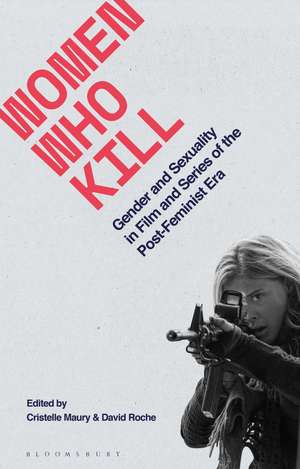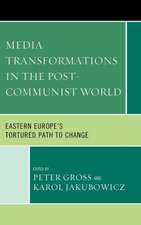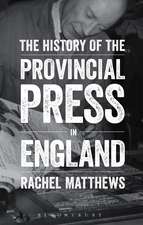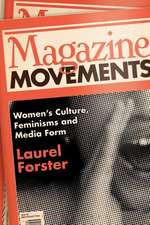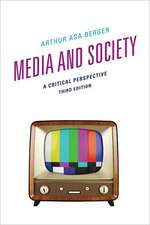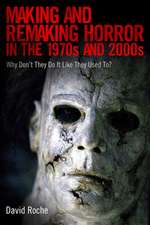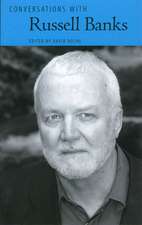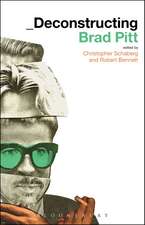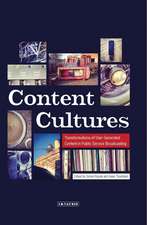Women Who Kill: Gender and Sexuality in Film and Series of the Post-Feminist Era: Library of Gender and Popular Culture
Editat de Dr David Roche, Cristelle Mauryen Limba Engleză Hardback – 19 feb 2020
| Toate formatele și edițiile | Preț | Express |
|---|---|---|
| Paperback (1) | 219.27 lei 6-8 săpt. | |
| Bloomsbury Publishing – 22 sep 2021 | 219.27 lei 6-8 săpt. | |
| Hardback (1) | 599.49 lei 3-5 săpt. | |
| Bloomsbury Publishing – 19 feb 2020 | 599.49 lei 3-5 săpt. |
Din seria Library of Gender and Popular Culture
- 22%
 Preț: 230.61 lei
Preț: 230.61 lei - 30%
 Preț: 567.99 lei
Preț: 567.99 lei - 23%
 Preț: 191.31 lei
Preț: 191.31 lei - 30%
 Preț: 656.47 lei
Preț: 656.47 lei - 23%
 Preț: 196.96 lei
Preț: 196.96 lei - 30%
 Preț: 540.09 lei
Preț: 540.09 lei - 20%
 Preț: 219.27 lei
Preț: 219.27 lei - 23%
 Preț: 174.07 lei
Preț: 174.07 lei - 23%
 Preț: 191.04 lei
Preț: 191.04 lei - 22%
 Preț: 231.34 lei
Preț: 231.34 lei - 30%
 Preț: 509.52 lei
Preț: 509.52 lei - 30%
 Preț: 540.65 lei
Preț: 540.65 lei - 30%
 Preț: 509.52 lei
Preț: 509.52 lei - 13%
 Preț: 174.25 lei
Preț: 174.25 lei - 28%
 Preț: 496.43 lei
Preț: 496.43 lei - 23%
 Preț: 197.24 lei
Preț: 197.24 lei - 23%
 Preț: 191.22 lei
Preț: 191.22 lei - 23%
 Preț: 223.28 lei
Preț: 223.28 lei - 30%
 Preț: 598.91 lei
Preț: 598.91 lei - 30%
 Preț: 510.03 lei
Preț: 510.03 lei - 24%
 Preț: 189.61 lei
Preț: 189.61 lei - 23%
 Preț: 191.56 lei
Preț: 191.56 lei - 24%
 Preț: 196.08 lei
Preț: 196.08 lei - 23%
 Preț: 146.78 lei
Preț: 146.78 lei - 21%
 Preț: 216.99 lei
Preț: 216.99 lei - 23%
 Preț: 197.24 lei
Preț: 197.24 lei - 24%
 Preț: 196.44 lei
Preț: 196.44 lei - 30%
 Preț: 538.61 lei
Preț: 538.61 lei - 23%
 Preț: 196.96 lei
Preț: 196.96 lei - 30%
 Preț: 597.87 lei
Preț: 597.87 lei - 23%
 Preț: 197.05 lei
Preț: 197.05 lei - 14%
 Preț: 176.44 lei
Preț: 176.44 lei - 23%
 Preț: 222.46 lei
Preț: 222.46 lei
Preț: 599.49 lei
Preț vechi: 859.18 lei
-30% Nou
Puncte Express: 899
Preț estimativ în valută:
114.71€ • 119.77$ • 94.94£
114.71€ • 119.77$ • 94.94£
Carte disponibilă
Livrare economică 15-29 martie
Preluare comenzi: 021 569.72.76
Specificații
ISBN-13: 9781350115590
ISBN-10: 1350115592
Pagini: 368
Ilustrații: 36 b/w illus
Dimensiuni: 138 x 216 x 23 mm
Greutate: 0.58 kg
Editura: Bloomsbury Publishing
Colecția Bloomsbury Academic
Seria Library of Gender and Popular Culture
Locul publicării:London, United Kingdom
ISBN-10: 1350115592
Pagini: 368
Ilustrații: 36 b/w illus
Dimensiuni: 138 x 216 x 23 mm
Greutate: 0.58 kg
Editura: Bloomsbury Publishing
Colecția Bloomsbury Academic
Seria Library of Gender and Popular Culture
Locul publicării:London, United Kingdom
Caracteristici
Considers a range of stereotypical figures from fiction, film, television and history: the vigilante, the femme fatale, the madwoman, and the monstrous feminine
Notă biografică
David Roche is Professor of Film Studies at Université Paul Valéry Montpellier 3, France and President of SERCIA. He is the author of Quentin Tarantino: Poetics and Politics of Cinematic Metafiction (2018) and Making and Remaking Horror in the 1970s and 2000s (2014), and has edited several books, including Comics and Adaptation (2018, with Benoît Mitaine and Isabelle Schmitt-Pitiot), Steven Spielberg, Hollywood Humanist & Wunderkind (2018) and Intimacy in Cinema (2014, with Isabelle Schmitt-Pitiot).Cristelle Maury is Associate Professor at Université Toulouse Jean Jaurès, France. She has published many articles on classical film noir and on the relationships between feminist film criticism and films. She has co-edited three issues of Miranda, on new forms of adaptations, on circulations and transfers in film, and on mapping gender.
Cuprins
Series Editor's Introduction, Angela Smith and Claire NallyIntroduction, Cristelle Maury and David RochePart I Neo-Femmes FatalesChapter 1 The Femme Fatale of the 1990s Erotic Thriller: A Post-feminist Killer?, Delphine LetortChapter 2 The African Femme Fatale: Re-Appropriation of a Mythical Figure in White Men Are Cracking Up (Ngozi Onwurah, 1994), Emilie HerbertChapter 3 Transwoman Who Kills: Hit & Miss (Sky Atlantic, 2012), Isabelle Schmitt-PitiotChapter 4 Genre and Gender in Sin City: A Dame to Kill For (Frank Miller and Robert Rodriguez, 2014), Christophe GellyChapter 5 Textbook Femme Fatale, De-eroticised Neo-noir Heroine or Post-Feminist Woman Who Kills? Genre Trouble in Gone Girl (David Fincher, 2014), Cristelle MauryPart II Action BabesChapter 6 From Sarah Connor 2.0 to Sarah Connor 3.0: Women Who Kill in the Terminator Franchise, Marianne Kac-VergneChapter 7 Girls against Women: Contrasting Female Violence in Contemporary Young Adult Dystopias, Adrienne BoutangChapter 8 Motherhood, Domesticity and Nurturing in the Post-Apocalyptic World: Negotiating Femininity in The Walking Dead (AMC, 2010-), Marta SuarezChapter 9 An Audience Studies Approach to Tarantino's Violent Heroines in Kill Bill (2003-2004) and Death Proof (2007), Connor WintertonChapter 10 Licensed to Kill? Arming and Disarming Female Killers in Action Film and Parody in Mad Max: Fury Road (George Miller, 2015) and Spy (Paul Feig, 2015), Elizabeth MullenPart III Monstrous WomenChapter 11 The Women Who Killed Too Many: Contagion (Steven Soderbergh, 2011) and Female Virality, Julia EcheverríaChapter 12 Black Female Empowerment, Intersectionality and the Ganja character in Da Sweet Blood of Jesus (Spike Lee, 2014), Hélène CharleryChapter 13 Monstrous Feminists? Witches, Murder, and Avatars of (Post-)feminism in American Horror Story: Coven (FX, 2013-2014), Mikaël ToulzaChapter 14 Furies and Female Empowerment: The Sword and the Pen in Byzantium (Neil Jordan, 2012) and Crimson Peak (Guillermo del Toro, 2015), Carolina Abello Onofre and Christophe ChambostChapter 15 Masculine Cultures of Technology and the Robotic Female Avenger in Ex Machina (Alex Garland, 2015), Samantha LindopChapter 16 "You're a Dangerous Girl": Beauty and Violence in The Neon Demon (Nicolas Winding Refn, 2016), Janice LoreckChapter 17 Evidence of Cruel Optimism - Nick Broomfield's Aileen: Life and Death of a Serial Killer (2003), Rosie WhiteAfterword Women Who Kill after #MeToo, David Roche and Cristelle MauryContributorsIndex
